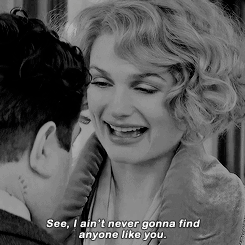Queenie Goldstein Is Morgana Pendragon
Queenie Goldstein is kind, charming, vibrant, and powerful; no wonder she instantly captured our hearts along with Jacob’s in Fantastic Beasts and Where to Find Them. Fans were understandably worried and upset when trailers for Fantastic Beasts: The Crimes of Grindelwald seemed to hint at a future full of turmoil for her. Many of our favorite characters may be sorely tempted by Grindelwald’s message, but evidence is piling up that Queenie may actually be drawn to join Grindelwald’s cause. Though I desperately hope it isn’t true, I find it perfectly plausible that Queenie will go dark and may even become a major antagonist in future Fantastic Beasts films. After all, that is what happened to another strong, kindhearted character I love: Morgana Pendragon from the BBC’s Merlin.
When she is first introduced in Merlin, Morgana is a spirited, compassionate character, much like Queenie. Morgana and Queenie are gentle souls who care deeply for their friends and use their power to do the right thing. Morgana and Queenie are able to form strong emotional bonds with people, as Queenie did with Jacob and Morgana did with young Mordred. Morgana and Queenie have huge hearts, they love fiercely and feel things strongly, and they are passionate and empathetic and completely endearing. Eventually, darkness all but overwhelms those qualities in Morgana.
Morgana vehemently opposes King Uther’s draconian policies against magic. When Uther executes Gwen’s father on suspicion of sorcery, Morgana is distraught and conspires to murder the king. Her expression throughout this episode is one of determination and terror, as though she feels she is in way over her head, and at the last second, she has a change of heart and saves him from the assassin. Queenie could have a similar crisis of conscience at first and turn away from Grindelwald. But Morgana eventually discovers she has magic herself, to her dismay. More than ever, she is afraid of Uther’s terrible retribution if he were to find out, she feels lonely and desperate with no one to confide in but Merlin and the Druids, and she begins to long for a world in which magical people can be free.
Magic is not persecuted in Queenie’s world, but it must be kept hidden from non-magical people, whom the law implies Queenie is supposed to fear. Jacob, however, is sweet and wonderful, unafraid of her magic, and she instantly falls for him. She’s heartbroken when they part ways at the end of the first film, but now it looks like she’s found a way for them to be together in defiance of the law. Having to hide their relationship for fear of severe punishment must be frustrating for Queenie, and her love for Jacob and curiosity about the No-Maj world may lead her to think that many lives would be made better if the laws keeping their worlds apart were dissolved. Thus, Queenie may face the same dilemma as Morgana; either they stand beside an institution that can be harsh and unjust but is also doing its best to bring peace and prosperity, or they topple that institution and envision a new world in which magical and non-magical people coexist.
Morgana soon encounters a powerful person who seems to share her vision of a new world but who is more concerned with her own power than the welfare of the people. Her half sister, Morgause, convinces Morgana that she alone cares for her and shares her vision and slowly cuts Morgana off from her loved ones. Arthur is Uther’s son and so represents the very institution Morgana hates. Gwen is a dear friend who has also been hurt by Uther, but she loves Arthur and Camelot more than Morgana. Merlin is forced to poison Morgana when Morgause uses her as a vessel for a plague that threatens the castle. Morgause saves her life, and Merlin’s betrayal seals Morgana’s fate. She is consumed by bitterness toward the people she used to love and a burning desire to see Uther and Arthur dead and Camelot reshaped in her image.

If Queenie is Morgana, then Morgause is Grindelwald, whose passionate appeal to truth and love draws Queenie in. Arthur is Tina, who represents MACUSA and everything Grindelwald and Queenie are against. Gwen is Jacob, who loves Queenie and who has also been hurt by Rappaport’s Law, but whose kinship with Newt makes him hesitant to join Grindelwald’s cause. And Merlin is Newt, who understands Queenie’s temptation but may be forced to abandon her when he chooses Dumbledore’s side. The stage is set for Grindelwald to pull Queenie toward him, driving a wedge between her and her loved ones, and convince her to cling to and amplify her bitterness toward the status quo. When Morgana overthrows Uther, she becomes a tyrant in his place because of Morgause’s influence. If Grindelwald manages to convince Queenie that she has been abandoned, that her pain and power together are her greatest weapons, that the world would be better if they were in charge, Queenie’s gentle soul might just be scarred enough for her to start to believe him.




